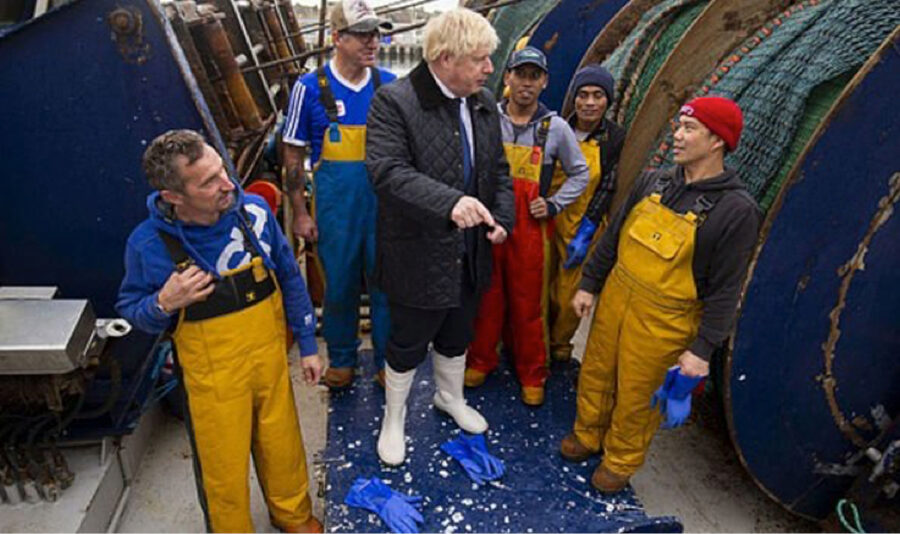Watershed for industry as UK leaves EU
Tough talking ahead on fisheries deal
One of the most significant events in the history of Britain’s fishing industry will take place this weekend, when the UK legally leaves the European Union and Common Fisheries Policy, reports Tim Oliver
Photo: Boris Johnson met crew aboard Opportunus IV PD 96 during a visit to Peterhead in September. (Photo: Getty)
The UK will officially leave the EU at 11pm GMT tomorrow – 31 January – more than three and a half years after the Brexit referendum in June 2016.
Prime minister Boris Johnson said that the UK has ‘crossed the Brexit finish line’ after parliament passed legislation last week finally implementing the EU withdrawal deal. He said the UK could now ‘move forwards as one’ and put ‘years of rancour and division behind it’.
The European parliament was due to meet on Wednesday this week (29 January) to debate the agreement, but its ratification was expected to be a formality.
But while this is a momentous event for the fishing industry, the next few months will be just as tough, as negotiations on the exact shape of the new fisheries relationship between the EU and the UK take place. There is also still the transition period to the end of this year, when nothing will materially change.
Boris Johnson has repeatedly said that fisheries will not be traded away, and he again made the pledge during a public questions session. Asked whether he would guarantee that we will have full control of fishing waters after Brexit, the prime minister said: “The answer is yes: we will take back control of our fishing waters, we will ensure we become an independent coastal state once again, having full jurisdiction over a 200-mile limit of our spectacular maritime wealth, and we will make sure we don’t trade away Britain’s fishing rights as they were traded away, for instance, in the access negotiations in the early 1970s. So be confident about fish.”
But fears remain that when push comes to shove, the industry will lose out in the wider trade deal talks. A more downbeat assessment came from Lord Gavin Barwell, the former Downing Street chief of staff who advised Theresa May on EU negotiations.
He told the BBC Radio 4 Today programme that there were ‘huge time pressures’ because the government is determined not to extend the deadline for a deal beyond the end of 2020, and the political declaration commits both sides to having a fishing agreement in place by 31 July.
His comments came after the Commission said it would not be ready to start trade talks with Britain until the end of February or beginning of March because of ‘institutional processes’.
He said that time pressures to get a fisheries deal done by the middle of the summer will give Brussels the upper hand in negotiations, and make it more likely that fishing will lose out. And he warned that the EU member states will refuse to ratify the fisheries deal if they do not get the access and quota shares they want, ramping up the pressure.
Lord Barwell told Today that Brussels was ‘running down the clock’ to put pressure on the UK because we have more to lose from a no-deal withdrawal than the EU.
He said: “[EU negotiator Michel] Barnier has said it again and again – if you guys want to leave by this deadline, that’s your problem, not ours. The EU doesn’t believe we can do the entire future relationship by the summer, and therefore we’re going to have to prioritise.”
The EU would then put pressure on the UK to agree on the things that are most important to it, such as fishing.
“It’s unavoidable that fish will have to be done early because if we are going to come out of the transition period at the end of this year, as the government wants, then this autumn we need to have negotiations about access to fish for 2021, so you’ve got to get that deal done quickly,” said Lord Barwell.
“The fear among the fishing industry that fishing will be traded off is a very acute one, because that is what they feel is exactly what happened in the negotiations when we originally joined the EU.
“This is the most difficult issue, because it will be very difficult for the UK to compromise on the principle that any deal is going to have to be ratified by all the national parliaments, almost certainly – and if they lose access to waters, are they realistically going to ratify the deal?”
The possibility of the UK walking away with no deal was also discussed. Lord Barwell said he did not believe this would be ‘a credible threat’ in the negotiations, because the EU believes it has less to lose from no deal than the UK.
“You can’t get round the need to find a deal both sides think they can live with. Leaving on WTO terms is a highly undesirable outcome for both sides,” he told Today.
He pointed out that the UK accounts for only about 15% of the EU’s exports, but the EU takes about 45% of UK exports.
Industry leaders meet MPs and peers
Senior UK fishing industry representatives were due to gather in parliament on Wednesday this week (29 January) to meet government ministers and around 100 MPs and peers to discuss Brexit and fishing.
The politicians included DEFRA ministers Theresa Villiers and George Eustice, Plymouth MP and shadow fisheries minister Luke Pollard and Edinburgh MP and SNP fisheries spokesperson Deidre Brock.
Discussions focused on the once-in-a-generation opportunities that will become available when the UK becomes an independent coastal state, and how these can be used to revive coastal communities and grow the UK’s role as a world leader in sustainable fisheries management.
The event was convened by the NFFO and the SFF.








